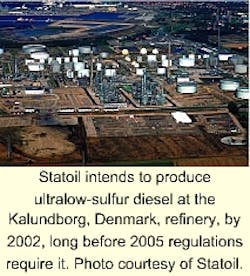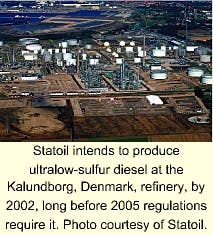Statoil to invest in green Danish refinery
Norway's Statoil AS will spend $50 million on a new diesel dearomatization unit at its Kalundborg refinery near Copenhagen as part of plans to get the jump on European sulfur content legislation due to come into force in 2005.
According to Statoil, the new plant, expected to be up and running by 2002, will cut the sulfur content of diesel by 80%, from 0.005% to just 0.001% (10 ppm), and "substantially reduce" carcinogenic aromatics and polyaromatics levels in the product.
The new unit will be a Synflex unit, licensed from ABB Lummus Global, Criterion Catalysts & Technologies, and ExxonMobil.
Erling Øverland, executive vice-president for manufacturing and marketing at Statoil, said the "considerable uncertainty" about the refinery's future had been "eliminated" by the investment decision.
While current European Union legislation permits a sulfur content of 0.035% in diesel, Danish authorities have been pressing for a lower upper limit.
"Our industry has usually lagged behind with decisions on environmental measures," said Øverland. "This time, we'll be delivering tomorrow's product before tomorrow arrives."
Statoil has yet to make a decision regarding a similar investment at its Mongstad refinery, north of Bergen, because this facility is different in design from Kalundborg.
The oil company said it is considering measures and investment to ensure that Mongstad can also meet future environmental requirements.

